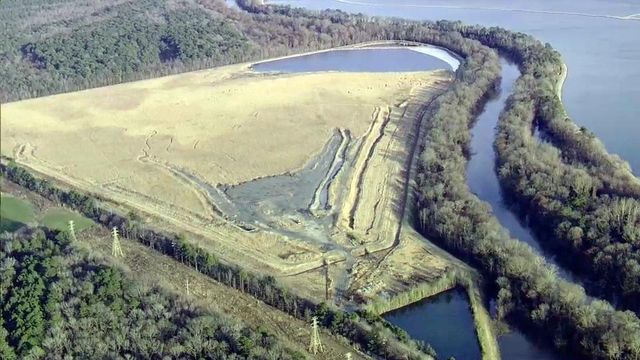Duke, DENR kept potential impacts of coal ash dam breaches secret
Duke Energy worked with North Carolina environmental regulators for years to ensure information about potential fallout from dam breaches - including those at coal ash ponds - would stay exempt from the state's public records law.
Posted — UpdatedDENR officials now point to the potential for terrorism as the reason for exempting these plans from public disclosure. But environmental advocates say they contain valuable information nearby communities can use to assess risk.
Complying with Duke's request
Criticism of Duke's coal ash storage practices has mounted since a Feb. 2 spill at the company's retired power plant near Eden that released about 40,000 tons of coal ash into the Dan River. The material, which contains arsenic, mercury, lead, boron and other heavy metals, poured into the waterway via a damaged drainage pipe, not a breached dam.
Three years before that accident, records show, environmental regulators reviewed the state's public records law to find out whether it was possible to comply with Duke's request to avoid the public disclosure of dam EAPs. Regulators focused on a provision of the law that protects "sensitive public security information."
Months later, Duke engineers held a conference call to discuss the issue, with a specific focus on how the company submitted its EAPs.
Russell added that state regulators had agreed to return mapping files that detailed potential damage from any possible breaches at a hydroelectric plant on the Green River in Henderson County to keep them among Duke's private files rather than in the possession of the state, where they might be subject to a public record request.
"We have received these files," he wrote. "Thank you."
But through at least February 2012, DENR released the EAPs as part of the public record. That was when the Southern Environmental Law Center received an EAP for ash ponds at the Asheville Steam Plant as part of a public records request.
"At the time that we got it, there wasn't such a hubbub about whether these things had to be produced," Patrick Hunter, an attorney at the Southern Environmental Law Center, said.
Duke representatives continued to press the point through December 2012, when an engineer contacted the state about removing more inundation maps for the ash ponds at the retired Lee Steam Plant in Wayne County.
In May 2013 – two years after Duke originally asked for confidentiality – DENR officials told another requester that EAPs were off limits to the public.
"One purpose of EAPs is to prescribe procedures to be followed in the event of an emergency caused by terrorism," DENR General Counsel Lacy Presnell wrote on May 14, 2013. "Furthermore, EAPs include detailed plans and drawings of the associated dams and security plans."
Other states also make exceptions
North Carolina is not the only state to declare such documents exempt from public records.
Payne also noted that a federal court decision used the "terrorism rationale" to determine that the number of houses affected by a dam breach "could and would be information that caused a dam to be more attractive and vulnerable."
Duke officials still maintain that rationale.
"While we are not commenting on the details of specific email exchanges, our practice is to keep emergency plans related to all major critical energy infrastructure (such as nuclear plants, fossil or hydro plants and transmission facilities) confidential," Duke spokesman Thomas Williams said Tuesday.
But Sandra Diaz, the Boone resident who saw her request for EAPs for coal ash dams near Asheville denied in May 2013, said there should be a balance between protecting public safety and using "a carte blanche excuse" to evade the public's right to know.
Diaz made her request as part of her work with a group advocating for environmental issues.
"People need to understand what the plan is if something like Dan River were to happen in, say, Asheville," Diaz said. "That greater public interest should definitely trump any small chance that a terrorist would look at it like it is a target."
Related Topics
• Credits
Copyright 2024 by Capitol Broadcasting Company. All rights reserved. This material may not be published, broadcast, rewritten or redistributed.






